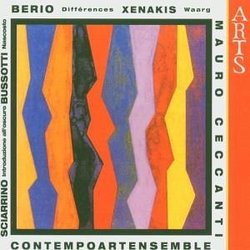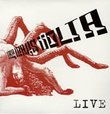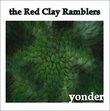| All Artists: Salvatore Sciarrino, Sylvano Bussotti, Luciano Berio, Iannis Xenakis, Mauro Ceccanti, Contempoartensemble, Contempoensemble Title: Music by Sciarrino, Bussotti, Berio and Xenakis Members Wishing: 1 Total Copies: 0 Label: Arts Music Release Date: 6/18/1996 Genre: Classical Style: Chamber Music Number of Discs: 1 SwapaCD Credits: 1 UPCs: 600554713526, 723723165022 |
Search - Salvatore Sciarrino, Sylvano Bussotti, Luciano Berio :: Music by Sciarrino, Bussotti, Berio and Xenakis
 | Salvatore Sciarrino, Sylvano Bussotti, Luciano Berio Music by Sciarrino, Bussotti, Berio and Xenakis Genre: Classical
|
Larger Image |
CD DetailsSimilar CDs
|
CD ReviewsSolid selection at budget price 04/20/1999 (4 out of 5 stars) "An eclectic and well-performed collection of modern European (mostly Italian) music. The Sciarrino piece (Introduction to the Obscure) is not one of his strongest recorded works, but the Berio (Differences) and Xenakis (Waarg) are excellent. Could serve as a useful introduction to any of the composers except Bussotti, whose short "Nascolto" is a homage to Boulez. Timing is rather skimpy at 43 minutes." Some info for you, but only about differences. Mark Grindell | Shipley,West Yorkshire | 04/29/2003 (4 out of 5 stars) "I actually talked to Mr Berio in 1981 about Differences. There is a somewhat curious situation with the piece. It's only available for hire - at some expense. It is VERY difficult to negotiate with the publishers about viewing it, but I have a feeling that this is only because UE have some problem in their Vienna headquarters about this, not the British or American agents, that's for sure.Differences is actually one of Berios most cogent pieces, and has such a strong tonal feel, that it is scarcely an inheritor of the post serialist sphere of ideas - yet it undoubtedly is a puzzle of a piece, and definitely part of the jigsaw of the late 20th century.Because I have never had access to the score, I can only guess, but the piece contains very novel unfolding of themes in an overlapping way that is reminiscent of fugal development. Perhaps the strong tonal feel is due to the unconscious recognition of fragments with strong logical connections, each fragment having the feeling of specific location. Some people will say that this is evidence of strict atonal technique, and all my feelings of key centers are actually illusional and based on comparative cognition only.Certainly, a piece like "Le marteaux sans Maitre" by Boulez is on the extreme edge of the this kind of cellular development idea. I have a book by a certain Bogaslaw Schaffer which describes this piece in great detail in these terms.One might compare Differences with Tempi Concertati, composed in the same year - but you would get nowhere fast. Tempi Concertati is for a far larger ensemble, with a leading instrument (the flute) with very different compositional intentions. It's interesting how Berio always seems capable of holding so many very different ideas at the same time.My very brief discussion with him was quite revealing. He is mildly dissatisfied with the development section after the second electronic interlude. He really wanted to return to this and re-write it, but it turned out that other projects really demanded attention, together with a time in America (I believe the piece was composed in Europe, probably Oneglia), and was interupted by the unexpected arrival of a member of Cathy Berberians family.But even unfinished, or incomplete pieces from this man are treasure indeed. I first heard a rendition from the Juilliard ensemble, which was played at a slightly slower tempo, and perhaps a little clearer. But I suspect that those players had the benefit of a long while with the score, and a lot of time to really contemplate the piece structurally. The players on this recording are nevertheless splendid and, give, of course, yet another view of the mystery. Thank you very much for a great and spirited performance.The other pieces are wonderfuly played, but I don't have a great deal of knowledge about them."
|

 Track Listings (4) - Disc #1
Track Listings (4) - Disc #1

